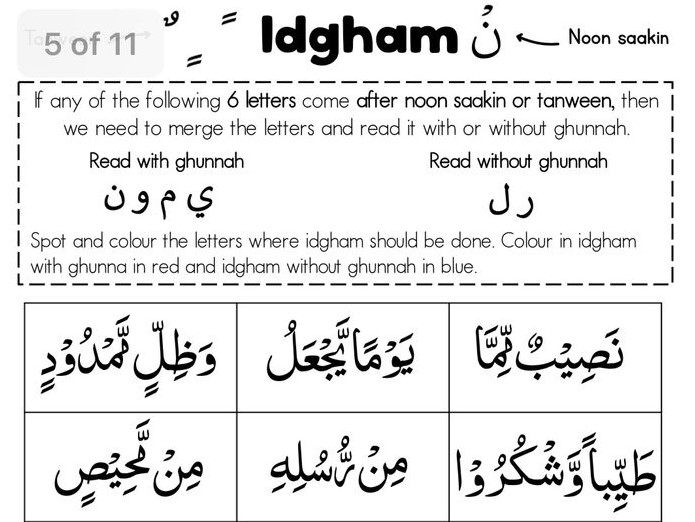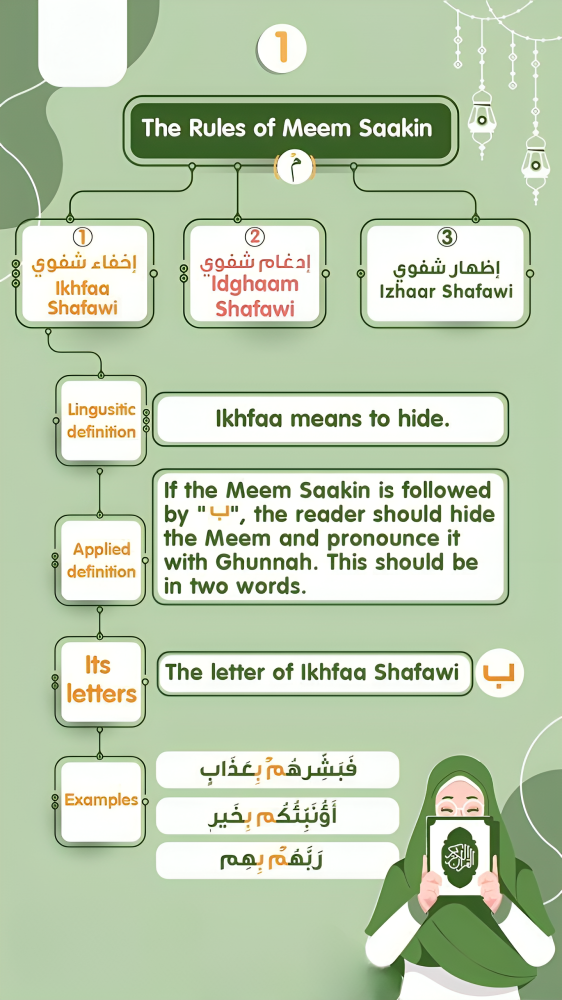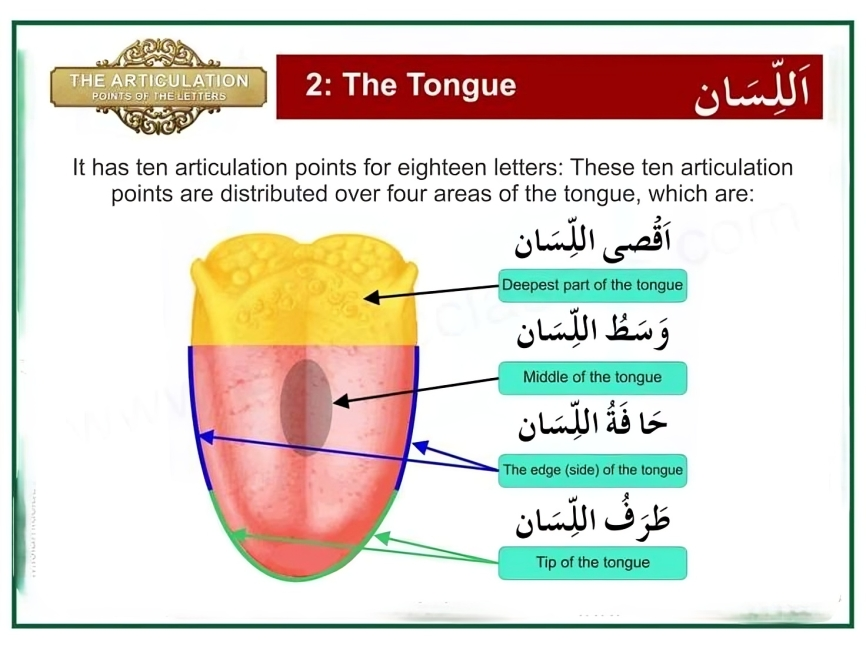The rules of Tajweed are essential for preserving the beauty and accuracy of Qur’anic recitation. Among these rules, Idgham is a key concept that enhances the flow and harmony of the recitation. In this blog, we’ll explore the meaning, types, examples, and practical tips to master Idgham, helping you elevate your connection with the words of Allah.
What is Idgham in Tajweed?
The term Idgham (إدغام) in Arabic means “merging” or “blending.” In Tajweed, Idgham occurs when a noon sakinah (نْ) or tanween (ـً, ـٍ, ـٌ) is followed by specific letters, resulting in the merging of the noon or tanween sound into the subsequent letter. This merging often involves partial or complete nasalization (ghunnah), depending on the type of Idgham.
The Letters of Idgham
Idgham applies when noon sakinah or tanween is followed by one of the following six letters:
ي (Ya), ر (Ra), م (Meem), ل (Lam), و (Waw), ن (Noon).
These letters are collectively remembered as يرملون (Ya, Ra, Meem, Lam, Waw, Noon).
Types of Idgham
Idgham is divided into two main categories based on the presence of nasalization (ghunnah):
1. Idgham with Ghunnah (إدغام بغنة)
- This type of Idgham occurs with four letters: ي (Ya), م (Meem), و (Waw), ن (Noon).
- The sound of the noon or tanween is merged into these letters with a slight nasal sound.
Example:
Surah Al-Baqarah (2:2)
“مِنْ وَاقٍ”
Explanation: The noon sakinah in “مِنْ” is followed by the letter و (Waw), requiring Idgham with Ghunnah.
2. Idgham without Ghunnah (إدغام بلا غنة)
- This type of Idgham occurs with two letters: ر (Ra) and ل (Lam).
- The merging is clear and without any nasalization.
Example:
Surah Al-Fil (105:4)
“فَجَعَلَهُمْ كَعَصْفٍ مَأْكُولٍ”
Explanation: The tanween in “كَعَصْفٍ” is followed by the letter ل (Lam), requiring Idgham without Ghunnah.
Conditions for Idgham
- Different Words
- Idgham only occurs when the noon sakinah or tanween and the merging letter are in two separate words.
- If they appear within the same word (idgham mutamathil), Idgham does not apply.
Example of Exception:
“الدُّنْيَا”
Here, Idgham does not apply despite the presence of a noon and a following ya because both are within the same word.
- Specific Letters
- Only the letters of يرملون trigger Idgham.
Practical Examples of Idgham
- Idgham with Ghunnah
Surah An-Nas (114:2) “مِنْ شَرِّ الْوَسْوَاسِ”- Explanation: The noon sakinah in “مِنْ” is followed by ش (Shin), but no Idgham occurs because it is not a letter of يرملون.
- Idgham without Ghunnah
Surah Al-Fajr (89:27) “يَا أَيَّتُهَا النَّفْسُ”- Explanation: The tanween in “أَيَّتُهَا” is followed by ن (Noon), requiring Idgham with Ghunnah.
Common Mistakes in Idgham
- Skipping Nasalization
- In Idgham with Ghunnah, failing to produce the nasal sound makes the recitation incomplete.
- Overemphasizing the Merge
- Exaggerating the merging sound can disrupt the natural flow of recitation.
- Applying Idgham Where It Doesn’t Apply
- Misapplying Idgham within a single word is a common error among beginners.
Tips to Master Idgham
- Practice with Examples
- Focus on verses containing Idgham to understand its application in different contexts.
- Listen to Expert Reciters
- Follow the recitation of renowned Qaris to learn proper merging and nasalization techniques.
- Seek Guidance from a Teacher
- A qualified Tajweed instructor can correct mistakes and guide you in mastering Idgham.
- Utilize Tajweed Apps and Resources
- Leverage online tools to practice Tajweed rules, including Idgham.
The Importance of Idgham in Tajweed
Idgham enhances the fluency and rhythm of Qur’anic recitation. By mastering this rule, you ensure your recitation reflects the divine eloquence of Allah’s words as intended. Proper application of Idgham not only beautifies your recitation but also fulfills the responsibility of preserving the Qur’an’s linguistic accuracy.
Conclusion
Understanding and applying Idgham is a crucial step in mastering Tajweed. Whether you are a beginner or an experienced reciter, revisiting the rules and practicing them can elevate your recitation to new heights. At Baytul Quran, we provide structured courses to help learners of all levels perfect their Tajweed, including Idgham and other essential rules.
Start Your Tajweed Journey Today!
Visit Baytul Quran and explore our comprehensive Tajweed programs designed to bring you closer to the words of Allah.
Related Tajweed Lessons
Deepen your understanding of Tajweed with these related lessons:
- Ikhfa in Tajweed – Learn about partial concealment of letters
- Makharij Al-Huroof – Master the articulation points of Arabic letters
- Noon Sakin & Tanween Rules – Understand nasal sound pronunciation
- Waqf Rules in Quran – Learn proper stopping points during recitation





